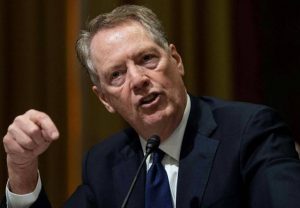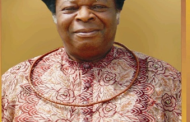Some political economists are already hitting him hard, saying he doesn’t know what he’s talking about. Such critics are asking how it could be possible for any serious person to separate trade from development as they figure Robert Lighthizer to be doing. They are also picking on his claim that the lack of an appellate body in the WTO (which was blocked by the USA anyway) has not affected trade because of qualified bureaucrats in the organisation. The question that has been thrown at him on that is whether those bureaucrats would disappear if a development expert (a reference to an Okonjo-Iweala) is appointed as head? The real reason for his opposition to Okonjo-Iweala, says the critics, is Iweala’s standpoint on multilateralism which is opposed to Trump’s preference for bilateral trade deals.
But, in the politics of power, can Robert Lighthizer be ignored? Coming from a practitioner of statecraft of a great power that has core interests, and with resources to deploy for influence, might the anti-Okonjo-Iweala sentiments of outgoing US Trade Chief, Robert Lighthizer, not transform into power, somehow?. Just what might be going on in the struggle for power at the WTO? Robert Lighthizer’s views have made the rounds three days ago. Intervention, however, finds it worth republishing the version in the London based Financial Times, the most comprehensive of it, particularly the background in the last three paragraphs.

A player in global rule writing on the move?
Outgoing US trade chief says leading WTO candidate lacks experience
- Robert Lighthizer warns it would be mistake to appoint former Nigerian finance minister
By Aime Williams in Washington
Donald Trump’s outgoing trade chief has warned it would be “a mistake” to appoint Ngozi Okonjo-Iweala to head the World Trade Organization, as he doubled down on his opposition to the consensus choice of the body’s 160 other members.
Robert Lighthizer, the current US trade representative, has been a longstanding critic of the WTO, which has been without a director-general since the unexpected early departure in August of Roberto Azevêdo, a Brazilian who had held the job since 2013.
In October, the US refused to back Ms Okonjo-Iweala, a former Nigerian finance minister, for the top post, leaving it without firm leadership in the middle of a pandemic.
Speaking to the FT, Mr Lighthizer said Ms Okonjo-Iweala had “no experience in trade at all”. “We need a person who actually knows trade, not somebody from the World Bank who does development,” said Mr Lighthizer, referring to Ms Okonjo-Iweala’s credentials.
“We need a trade person with real trade experience,” he added. “And there are very few areas where you would say, ‘here’s an organisation in very bad shape, let’s get someone who knows nothing about its core mission’.”
The US has previously said in statements only that it supports South Korea’s Yoo Myung-hee, the other remaining candidate for the job, calling her a “bona fide trade expert”.
Mr Lighthizer’s comments represent the most detailed explanation for the Trump administration’s opposition to Ms Okonjo-Iweala’s candidacy. It comes amid fears among Mr Trump’s trade advisers that the US could abandon its opposition after Joe Biden takes office on Wednesday.
Ms Okonjo-Iweala, who holds US as well as Nigerian citizenship, has emphasised her experience as a World Bank managing director and her role as chair of the board of Gavi, a public-private alliance to develop vaccines for low-income countries.
A spokesperson for Ms Okonjo-Iweala said: “After a rigorous three-round selection process which began with a field of eight very qualified candidates, Ms Okonjo-Iweala looks forward to engaging with the Biden administration and is hopeful that final consensus will soon be reached.
“The WTO urgently needs to get to work at this time of global crisis.”
The delay in appointing a director-general has left the WTO without permanent leadership at a time when its capacity to promote rules-based trade has been undermined by geopolitical tensions between the US and China, and global economic growth has been destroyed by the coronavirus pandemic.

Dr. Ngozi Okonjo-Iweala
Democratic and Republican administrations alike have been unhappy with the WTO’s appellate body — the influential panel that rules on disputes between its members — viewing its rulings not only as an infringement on sovereignty but also as failing to deal with China’s trade practices. In late 2019, the US hamstrung the WTO’s appellate body by blocking the appointment of new judges.
Earlier in his career as a lawyer for the US steel industry, Mr Lighthizer frequently clashed with the WTO and has long argued that the appellate body oversteps its brief and creates law rather than interprets trade agreements.
Mr Lighthizer, who has often called the WTO a “failed organisation” said that while he did not want to indulge in “pessimism”, the prospects of successfully reforming the body were “not good”.
“It’s a dim prospect, and it’s because there are so many people in the organisation, and they block and they get blocked,” he said.
But while the US’s refusal to support Ms Okonjo-Iweala and appoint new appellate body judges has dismayed European diplomats, Mr Lighthizer insisted that the dysfunction of the WTO does not have “any particular effect on trade”.
“I don’t think that the fact that we’ve had no appellate body for more than a year has had a negative effect on trade at all,” said Mr Lighthizer. “I think that sort of, you know, people who are professional bureaucrats get in there and put all this great emphasis on the bureaucratic stuff they do, and the reality is it doesn’t really have any effect. Maybe a little tiny bit in some areas around the fringe.”
He added that he felt many members of the WTO “view it as basically a way to increase development, rather than to increase trade”.
Joe Biden to remain tough on trade while re-embracing partners
While diplomats in Brussels and Geneva hope that the Biden administration will keep its election pledge to increase Washington’s support for multilateral institutions such as the WTO, the Biden team has so far not declared whether it plans to back Ms Okonjo-Iweala’s bid to lead the WTO, which would allow the body to proceed with the appointment of a new director-general.
In Washington, Mr Lighthizer is widely credited with changing the way the US political establishment thinks about international trade, moving policy away from a focus on deals driven by business interests and towards a worker-centric protectionism that has sought to boost domestic employment and bring back supply chains that have moved overseas.
He said he expected the Biden administration to follow suit. “The president-elect did not run against our trade policy,” Mr Lighthizer said. “He tried to put his own spin on it and talk about a different version of America First, and that’s what he ran on. He didn’t criticise the stuff we did.”




























